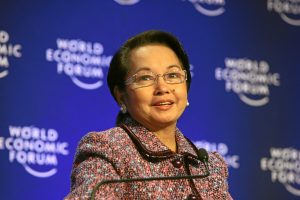Philippine President Rodrigo Duterte’s announcement that he is amenable to being considered as a vice presidential candidate in the 2022 elections has ignited fierce debates on whether it is permissible under the 1987 Constitution, which limits presidents to a single six-year term in office.
This matter will be resolved late this year if Duterte pushes through with his candidacy, which is expected to be challenged in the Supreme Court.
A sitting president aspiring to become vice president is indeed unprecedented in Philippine history, but a president running for a lower elected position is not without precedent. In fact, two previous presidents have already done this.
Former President Gloria Macapagal Arroyo, who was in office from 2001 to 2010, filed her candidacy as a congressional representative in her home province when she was still the country’s head of state in 2009. She served as a legislator for three terms until 2019. Meanwhile, former President Joseph Estrada, who preceded Arroyo in office from 1998 to 2001, successfully ran for mayor of Manila in 2013 and was reelected in 2016.
Those who are not familiar with Philippine politics might ask: Isn’t winning the presidency supposed to be the ultimate goal of politicians? If so, why do Philippine presidents, who already acquired the coveted prize in politics, keep on running for lower office?
Under the country’s constitution, the president can serve for only six years and he or she is ineligible to seek another term in office. Those who are campaigning to amend the constitution are citing the term restriction as irrational since it supposedly prevents a good leader from carrying out an agenda of reform for another six years.
They forget to mention that the term limit was placed there precisely because of the country’s painful experience under the government of former strongman Ferdinand Marcos, who ruled the country for two decades. Besides, the Philippines has also had former presidents, who ended their term and did not run for another election.
The decision of Arroyo, Estrada, and possibly Duterte to run again for public office even after becoming president can be explained by understanding what happened during the final years of their time in power.
In the case of Arroyo, her presidency suffered a lack of legitimacy after she was accused of electoral fraud. Corruption scandals also hounded her administration. Arroyo’s decision to run for Congress was seen by her critics as a maneuver to undermine the efforts of the succeeding government to pursue accountability.
For Estrada, his supporters believe his bid to become the mayor of the country’s capital was his way of seeking political redemption after he was ousted from power in 2001, and thereby prevented from completing his term as president.
The motives of Arroyo and Estrada were both self-serving, although they would probably insist that they only wanted to continue serving the public.
Duterte, too, has stated that his candidacy as vice president would provide “equilibrium” to the country’s politics. He did not elaborate, although this contradicted the 76-year-old’s previous pronouncements about being tired and wanting to retire from politics.
Contrary to Duterte’s claim, his candidacy could be divisive – aside from triggering a potential constitutional crisis. Some experts think that it would circumvent the intent of the constitution to prevent an incumbent president from seeking another term.
This could also be part of Duterte’s plan to avoid prosecution at the International Criminal Court, which is investigating the human rights atrocities linked to his bloody war on drugs. There could be corruption charges as well, which could be brought against him and his family once he leaves office in 2022. Perhaps the Philippine leader thinks he can evade accountability if he becomes vice president in the next administration.
The legal basis of Duterte’s plan to become vice president should be the least of his concerns. He should first convince the voting public that he deserves to be elected again even after he failed to fulfill his campaign promises in 2016. He recently admitted that he has nothing to show for his presidency, yet is confident that voters will still choose him to become the second-highest official of the land.
Perhaps Duterte can learn from the experience of his predecessors, who did not retire but opted to compete again in the electoral arena. Estrada won two terms but lost in his third attempt to serve as mayor in 2019. Arroyo was elected to Congress but it did not stop the government of the late President Noynoy Aquino from jailing her after she was charged with plunder.

































